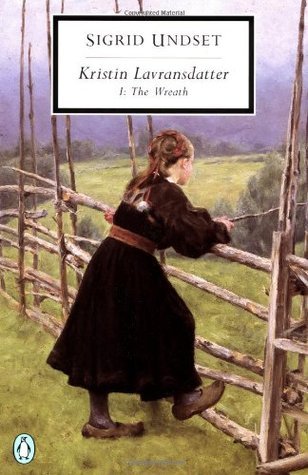She laughed quietly and then she said, "I've had my glory days, Kristin, but I'm not foolish enough to complain because I have to be content with sour, watered-down milk now that I've drunk up all my wine and ale. Good days can last a long time if one tends to things with care and caution; all sensible people know that. That's why I think that sensible people have to be satisfied with the good days--for the grandest of days are costly indeed. They call a man a fool who fritters away his father's inheritance in order to enjoy himself in his youth. Everyone is entitled to his own opinion about that. But I call him a true idiot and fool only if he regrets his actions afterward, and he is twice the fool and the greatest buffoon of all if he expects to see his drinking companions again once the inheritance is gone."
Sigrid Undset's Kristin Lavransdatter novel follow the title heroine throughout her life living in medieval Norway. She is the daughter of Lavrans and Ragnfrid, a couple who have had to bury three sons before Kristin came along. For that reason her parents are devoted to her, though in different ways--the steady, kind Lavrans and the neurotic, aloof Ragnfrid are not quite perfectly matched--and Kristin tests their love for her when he decides she cannot marry the capable Simon Darre, who her parents have arranged for her to marry, and instead falls in love with Erlend Nikulausson, a dashing older man with a checkered past.
The Wreath is a story you see again and again, and not just in "bodice-rippers" like this one: a headstrong woman rejects her parent's choice of husband for a man she has chosen herself. But few novels, or movies or TV shows for that matter, tell that story as well as Undset does. The story is delicately wrought and genuinely compelling, driven by moments of real tension and drama: the wayward bull that cripples Kristin's sister Ulvhild for life, for instance, or the attempted rape by a local boy that complicates Kristin's reputation among the smallholders in the village when she's only a teenager. Or when Erlend's former mistress shows up and tries to poison Kristin.
But the thing that makes The Wreath stand out most from those other stories is that it takes all sides of the conflict seriously. Erlend is not a misunderstood hero; he's a man whose reliability is questionable and whose mistakes have genuinely hurt others, even though Kristin loves him in spite of these things. Lavrans is not a Capulet who rejects his daughter's autonomy without reason; his fear for his daughter's reputation, honor, and lineage is the surest proof of his love for her. And yet the power of Kristin and Erlend's love is strong enough to obviate petty things like reason.
Most importantly, Undset takes the ideas of sin and guilt seriously. If you are unable to accept that Kristin's fornication with Erlend is really a transgression against both her human father and against God, the agony that makes up the central internal conflict of the story probably won't land for you. Even in the early 20th century when Undset wrote The Wreath, the seriousness of that transgression probably didn't translate easily from the medieval mindset. But the most powerful parts of The Wreath come when Kristin is forced to confront her sin and make penance for it, and when she tries to both honor the religious commitment she makes to Erlend and the one she owes to Lavrans. Undset clearly believes that the state of Kristin's soul is something that matters, and that seems utterly foreign to the landscape of modern fiction.
Eventually, Kristin and Erlend marry. They know that their life may not be an easy one, but they've chosen it, and each other, freely. Undset ends the novel with a scene not in the bed of the two newlyweds, but of Lavrans and Ragnfrid, the old couple who have tried to do their best for each other and for their daughter. Kristin's marriage has opened up an old wound in their lives, forcing them to confront their own arranged marriage, the exact sort of union that their daughter has rejected. It's a tender, sad moment that exposes just how complex the moral choices we are forced to make can be.


No comments:
Post a Comment